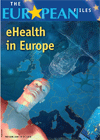 This special issue reflects the diversity of people involved in developing eHealth and integrating it to healthcare policies. Mobilising all these people and coordinating their actions, at a regional, national and European level, is essential in order for eHealth to realise its potential. The introduction of ITCs in the healthcare field is giving rise to many expectations and questions which will be discussed in this issue.
This special issue reflects the diversity of people involved in developing eHealth and integrating it to healthcare policies. Mobilising all these people and coordinating their actions, at a regional, national and European level, is essential in order for eHealth to realise its potential. The introduction of ITCs in the healthcare field is giving rise to many expectations and questions which will be discussed in this issue. Expectations are various: facing the demographic challenge, the possibility to ensure better fallow-up for elderly people, generally suffering from chronic diseases, and reducing costs (costs for chronic diseases represent some 60% of total healthcare expenses), to reinforce patient safety, to guarantee healthcare professionals access to patient information, anywhere in Europe; to offer preventive and proactive medical devices; to facilitate personalised treatment and therefore improve its impact; to give patients an active part in managing their healthcare.
Questions are just as numerous: Will ICTs help protect medical data or on the contrary, by increasing information and service mobility, make it more vulnerable? Do any eHealth evaluation methods exist so we can first focus on the eHealth services with biggest added value? What legislation are further needed for developing eHealth? What new responsibilities are healthcare professionals faced with? Can eHealth be one of the 'Locomotives' taking us out of the financial crises?
Download eHealth: A Solution for European Healthcare Systems? (.pdf, 2.348 KB).
Download La e-santé: une solution pour les systèmes de santé européens? (.pdf, 2.400 KB).
Download from the eHealthNews.EU Portal's mirror: eHealth: A Solution for European Healthcare Systems? (.pdf, 2.348 KB).
For further information:
ICT for Health
European Commission - Information society and Media DG
Office: BU31 06/73 B-1049 Brussels
Tel: +32 2 296 41 94
Fax: +32 2 296 01 81
http://europa.eu/information_society/eHealth